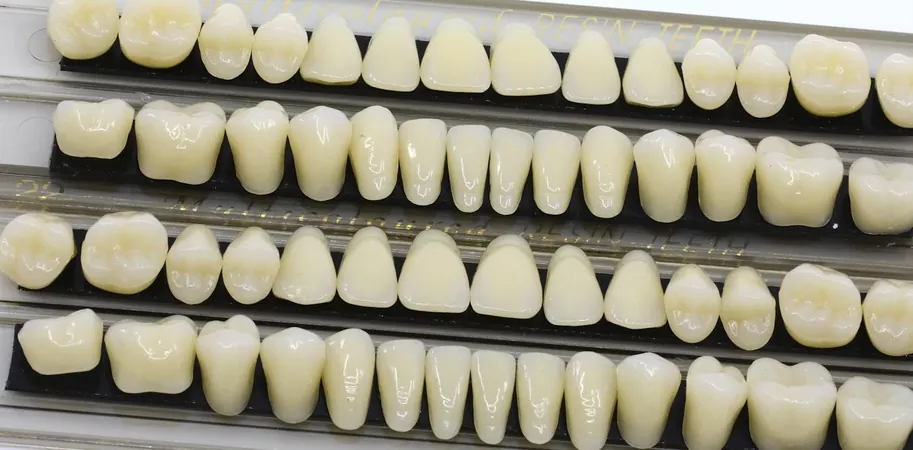
Unlocking Brain Power: How Probiotics May Revolutionize Cognitive Health
2025-06-02
Author: Jia
New Research Reveals Probiotics Boost Cognitive Function
A groundbreaking study from Henan University showcases the exciting potential of probiotics in enhancing cognitive abilities for those suffering from cognitive impairment. This research could reshape our understanding of the gut-brain connection as a viable target for treating neurodegenerative conditions like Alzheimer's.
The Gut-Brain Connection: A New Frontier in Brain Health
The emerging evidence supports what many experts have theorized: adjusting gut microbiota through probiotics could significantly nurture brain health. The analysis, which examined data from 10 randomized controlled trials involving 778 participants, found that those who took probiotics showed a moderate yet statistically significant improvement in cognitive function compared to a placebo.
Single-Strain Probiotics Shine
The study revealed that specific single-strain probiotics, especially when taken for shorter periods—twelve weeks or less—led to the most notable cognitive enhancements. The strongest results were observed using the Mini-Mental State Examination (MMSE), with a standardized mean difference of 0.88, demonstrating the tangible benefits of these gut-friendly supplements.
Decoding the Gut-Brain Axis
This research reinforces the relevance of the gut-brain axis in clinical practice. This intricate communication system links gut microbiota with brain function, impacting mood, cognition, and overall mental health through a mix of neural, hormonal, and immune pathways. Probiotics may act as agents of change by reducing inflammation and enhancing neurotransmitter regulation—key elements in the fight against neurodegenerative diseases.
Navigating Uncertainties: Dosage and Long-Term Effects in Question
Despite these promising findings, significant uncertainties linger. The ideal dosage and frequency for probiotic supplementation are still unclear, with trial variations leaving gaps in standardized recommendations. Moreover, studies extending beyond twelve weeks showed diminished cognitive benefits, raising concerns about the sustainability of the positive effects.
The Market is Hot: Growing Demand and Regulatory Challenges
As the global probiotics market continues to expand, particularly in the realm of cognitive health, demands for accessible and affordable solutions are surging. With projections estimating that over 152 million people will live with dementia by 2050, the incentive for companies to innovate in this space is skyrocketing. However, with such growth comes the need for robust clinical evidence to back health claims, alongside navigation through complex regulatory requirements.
Call for Collaborative Efforts in Probiotic Research
Researchers stress the need for interdisciplinary collaboration among neuroscience, microbiology, and clinical practices to harness the full power of probiotics effectively. The gut-brain axis has transitioned from theoretical musings to a tangible concept, potentially transforming how we address cognitive decline.
Conclusion: A Bright Future for Probiotic Research
The study’s authors underscore the potential of probiotics to enhance cognitive abilities, laying a solid scientific foundation for their application in neurodegenerative diseases. Future research must refine dosage and administration protocols to maximize benefits, while collaboration across disciplines should be a cornerstone of ongoing research aimed at improving brain health.



 Brasil (PT)
Brasil (PT)
 Canada (EN)
Canada (EN)
 Chile (ES)
Chile (ES)
 Česko (CS)
Česko (CS)
 대한민국 (KO)
대한민국 (KO)
 España (ES)
España (ES)
 France (FR)
France (FR)
 Hong Kong (EN)
Hong Kong (EN)
 Italia (IT)
Italia (IT)
 日本 (JA)
日本 (JA)
 Magyarország (HU)
Magyarország (HU)
 Norge (NO)
Norge (NO)
 Polska (PL)
Polska (PL)
 Schweiz (DE)
Schweiz (DE)
 Singapore (EN)
Singapore (EN)
 Sverige (SV)
Sverige (SV)
 Suomi (FI)
Suomi (FI)
 Türkiye (TR)
Türkiye (TR)
 الإمارات العربية المتحدة (AR)
الإمارات العربية المتحدة (AR)